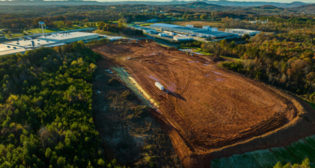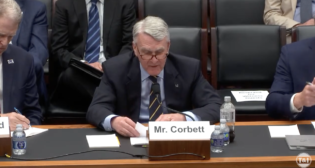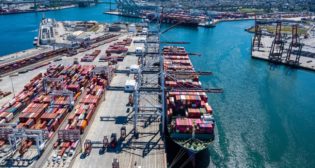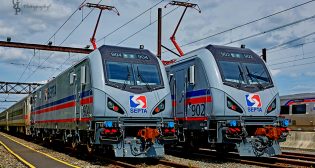
NYCT: Bombardier R179 Fleet Returning to Service
Written by Marybeth Luczak, Executive Editor
The fleet was removed from revenue service in June after two cars on a 10-car A train going northbound separated at a drawbar draft gear assembly. Photo: Marc A. Hermann / MTA New York City Transit
MTA New York City Transit (NYCT) started returning its Bombardier R179 fleet to revenue service Sept. 23.
The move follows phase one of a comprehensive review of three production quality issues that emerged from May 2019 to June 2020. (Car delivery began in 2016.)
A panel of outside experts was tasked with the review and developing a return-to-service plan for the 318 rapid transit cars, which were removed from service in June after a trainset-separation incident on the A line. It has determined that all known production quality issues “have been adequately addressed” by NYCT.
The three quality issues involved:
1. Primary side collision post welds. Bombardier found anomalies in May 2019 during a routine inspection at the production facility. According to the panel’s report, “Bombardier performed an engineering validation and a safety assessment of production and installed posts on R179 cars and determined that the cars delivered to NYCT were safe to operate. An independent safety assessment concluded that all cars delivered to date were safe for revenue service.”
2. Door operations. On Dec. 24, 2019, and Jan. 3, 2020, “two un-commanded door openings took place while R179 cars were in motion,” according to the report. “In both instances, door closure status was lost, propulsion was removed, and the train coasted to a stop. NYCT removed the fleet from revenue service while Bombardier performed an engineering review. Testing and analysis revealed workmanship issues with the system’s door solenoid lock switch, and software deficiencies in the door motor control unit. Bombardier, with oversight from LTK, NYCT’s consultant, performed field modifications to address the solenoid lock and software issues and confirmed that the R179 fleet was safe to resume revenue service.”
3. Draft gear: On June 3, 2020, two R179 cars on a 10-car A train separated in revenue service at a drawbar draft gear assembly. According to the report: “After parting, both sides of the train came to an immediate emergency stop. NYCT removed the fleet from revenue service pending an investigation. Bombardier and the draft gear manufacturer discovered that a spiral pin was missing from the draft gear assembly and allowed the cars to separate. The omission of the spiral pin was traced to the manufacturer’s assembly line. An emergency inspection of the R179 fleet was completed on June 5, 2020, with no other instances of missing spiral pins detected.”
Panel Recommendations
Following a review of R179 technical documentation and meetings with NYCT technical staff and LTK consultants, the panel recommended that NYCT adopt a comprehensive return-to-service process. The aim: to detect any other quality issues as quickly possible and provide an opportunity to “restore confidence” in the R179 fleet as it transitions to revenue service.
The process includes preparation, simulated service and performance monitoring:
• Preparation. Among the preparation efforts: identifying and testing all pending software/firmware upgrades, and performing pre-inspection and/or periodic maintenance on each R179 subway car and trainset—before running cars in simulated service and returning them to revenue service.
• Simulated service. R179 eight-car trainsets must run in simulated service “to confirm proper operation of all train systems including software and firmware upgrades.”
• Performance monitoring. NYCT must track and record significant R179 fleet failures and report those daily to panel members; issue a weekly report and establish a weekly meeting with the panel to discuss fleet performance; and report Mean Distance Between Failure (MDBF) and Mean Distance Between Component Failure (MDBCF) monthly or as available.
For the review’s second phase, the panel will, in the coming months, address lessons learned and develop quality assurance recommendations for future railcar procurements.
The panel is chaired by Robert Lauby, former Associate Administrator for Railroad Safety and Chief Safety Officer for the Federal Railroad Administration. Other panelists are Carolyn Flowers, former Acting Administrator for the Federal Transit Administration and current Managing Principal at InfraStrategies LLC; J. Victor Lebacqz, former Associate Administrator for Aeronautics Research at NASA; and Thomas Kurfess, Professor of Mechanical Engineering at Georgia Tech.
Bombardier Responds:
“We understand that the New York City Transit-appointed R179 Review Panel, which is conducting a review of the R179 subway car fleet, has now completed its Phase 1 Report. We have been supporting our customer during the review process and have fully complied with the Panel’s requests for information. Bombardier stands behind the safety and quality of its products and takes every measure to honor its commitments to its customers.
“We’re pleased that the Panel has concluded that recent issues have been adequately and safely addressed, and that it recommends that NYCT return the R179 fleet to revenue service. We are already cooperating with NYCT on a three-step return-to-service process and trust that the fleet soon will be serving passengers safely and reliably once again.
“We strongly believe the R179s are on a path to the highest level of performance, similar to the R62A and R142 subway cars, M7 commuter cars, and other products and services Bombardier has supplied to the MTA and to the transit industry at large.
“We are especially proud and most appreciative of almost 40 years of partnership with MTA, NYCT, Long Island Rail Road and Metro-North, providing quality railcar products that are assembled in upstate New York with supplier participation statewide.
“We look forward to building renewed confidence in Bombardier and our products, and to continuing to support the MTA, especially during these challenging times.”
To view the panel’s full report, including all return-to-service process details, click here.
In other developments, New York Metropolitan Transportation Authority (MTA) Chairman and CEO Patrick J. Foye recently sent warning letters to MTA’s 11 largest suppliers alerting them that due to the pandemic, “many current and all future contracts are in jeopardy without an injection of $12 billion in emergency federal aid.” Click here for more.



